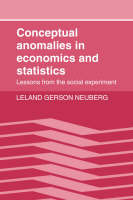
Conceptual Anomalies in Economics and Statistics
Lessons from the Social Experiment
Seiten
1989
Cambridge University Press (Verlag)
978-0-521-30444-3 (ISBN)
Cambridge University Press (Verlag)
978-0-521-30444-3 (ISBN)
This book explores anomalies in the conceptual basis of such experiments and in the foundations of statistics and economics more generally. Drawing upon several examples, the author argues that methodological anomalies prevent microeconomics and statistics from explaining human social behaviour as coherently as the physical sciences explain nature.
Do economics and statistics succeed in explaining human social behaviour? To answer this question. Leland Gerson Neuberg studies some pioneering controlled social experiments. Starting in the late 1960s, economists and statisticians sought to improve social policy formation with random assignment experiments such as those that provided income guarantees in the form of a negative income tax. This book explores anomalies in the conceptual basis of such experiments and in the foundations of statistics and economics more generally. Scientific inquiry always faces certain philosophical problems. Controlled experiments of human social behaviour, however, cannot avoid some methodological difficulties not evident in physical science experiments. Drawing upon several examples, the author argues that methodological anomalies prevent microeconomics and statistics from explaining human social behaviour as coherently as the physical sciences explain nature. He concludes that controlled social experiments are a frequently overrated tool for social policy improvement.
Do economics and statistics succeed in explaining human social behaviour? To answer this question. Leland Gerson Neuberg studies some pioneering controlled social experiments. Starting in the late 1960s, economists and statisticians sought to improve social policy formation with random assignment experiments such as those that provided income guarantees in the form of a negative income tax. This book explores anomalies in the conceptual basis of such experiments and in the foundations of statistics and economics more generally. Scientific inquiry always faces certain philosophical problems. Controlled experiments of human social behaviour, however, cannot avoid some methodological difficulties not evident in physical science experiments. Drawing upon several examples, the author argues that methodological anomalies prevent microeconomics and statistics from explaining human social behaviour as coherently as the physical sciences explain nature. He concludes that controlled social experiments are a frequently overrated tool for social policy improvement.
Preface; Introduction; Part I. Statistical Logics: 1. J. S. Mill and some philosophical underpinnings of controlled experimentation; 2. R. A. Fisher, randomization, and controlled experimentation; 3. Some special difficulties of controlled social experiments; 4. Hume's problem of induction in modern statistical inference and controlled experimentation; Part II. Economic Logics: 5. Problems with a rationalist account of classical mechanics; 6. Microeconomics striving to be a classical-mechanics-like science; 7. The income maintenance experiments: microeconomic science or scientism?; 8. Microeconomics striving to be deontology; Conclusion; Appendix; References; Symbols and abbreviations; Index.
| Erscheint lt. Verlag | 26.5.1989 |
|---|---|
| Verlagsort | Cambridge |
| Sprache | englisch |
| Maße | 152 x 228 mm |
| Gewicht | 652 g |
| Themenwelt | Wirtschaft ► Volkswirtschaftslehre ► Ökonometrie |
| ISBN-10 | 0-521-30444-X / 052130444X |
| ISBN-13 | 978-0-521-30444-3 / 9780521304443 |
| Zustand | Neuware |
| Haben Sie eine Frage zum Produkt? |
Mehr entdecken
aus dem Bereich
aus dem Bereich
Übungsaufgaben – Fallstudien – Lösungen
Buch | Softcover (2022)
De Gruyter Oldenbourg (Verlag)
CHF 34,90
mit Aufgaben, Klausuren und Lösungen
Buch | Softcover (2023)
UTB (Verlag)
CHF 34,85
Set aus Lehr- und Arbeitsbuch
Buch | Softcover (2022)
De Gruyter Oldenbourg (Verlag)
CHF 49,95


